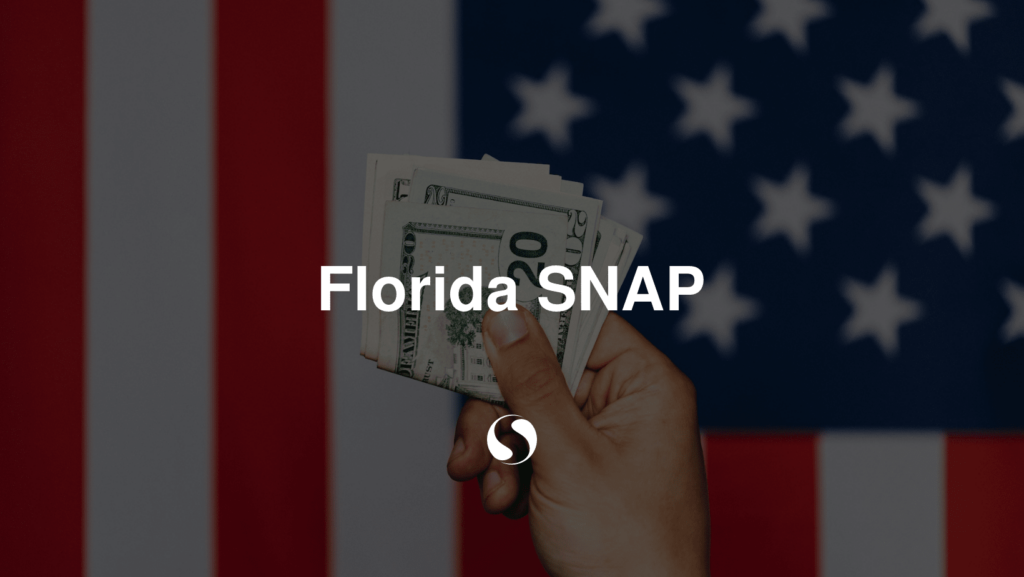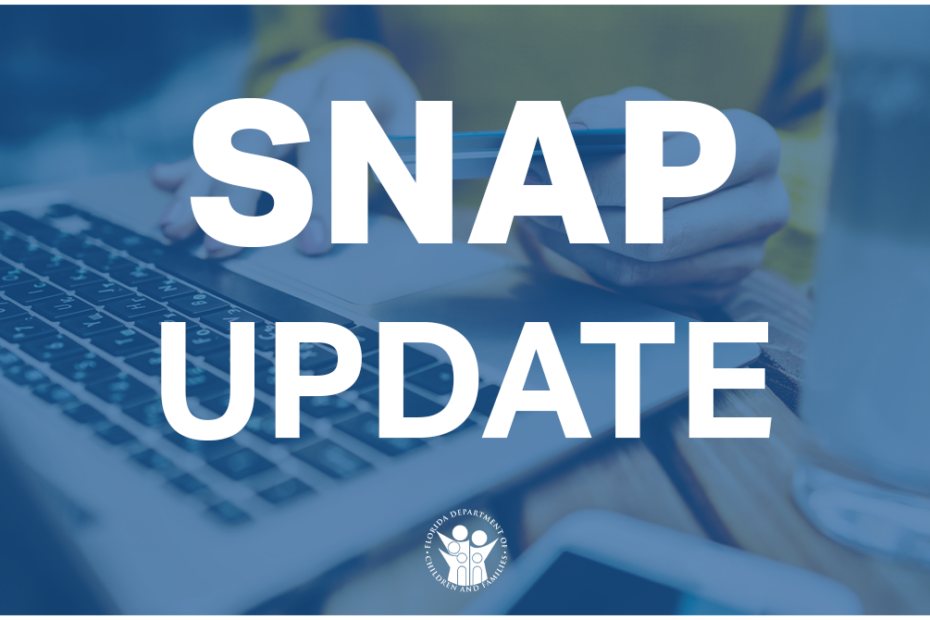Florida SNAP: The Supplemental Nutrition Assistance Program (SNAP), formerly known as food stamps, provides food-purchasing assistance for low- and no-income people in Florida. SNAP is administered by the Florida Department of Children and Families (DCF).
The gross income limit for a household of one person is $1,340 per month. For a household of two people, the limit is $1,805 per month. For a household of three people, the limit is $2,270 per month. For each additional person in the household, the limit increases by $465 per month.
To be eligible for SNAP benefits in Florida, applicants must meet certain requirements related to income, assets, and non-financial criteria. Key eligibility factors include:
- Households must meet income limits based on household size. Gross and net income limits apply.
- Income includes earned income like wages and unearned income like child support and unemployment benefits.
- Applicants must be U.S. citizens or eligible non-citizens.
- Able-bodied adults without dependents must meet work requirements.
- Applicants must provide a Social Security number.
- Applicants must be Florida residents.
- The size of a SNAP household is based on the number of people who buy and prepare food together.
Meeting the SNAP eligibility guidelines is essential for qualifying and receiving benefits in Florida. The state uses broad criteria but has specific limits that applicants must satisfy.
Also check : – Utah SNAP Income Limits and Medicaid Texas
Florida SNAP Income Limits 2024

| Household Size | Maximum Income to Qualify |
| 1 | $2020 |
| 2 | $2704 |
| 3 | $3388 |
| 4 | $4072 |
| 5 | $4756 |
| 6 | $5440 |
| 7 | $6124 |
| 8 | $6808 |
Florida uses SNAP income guidelines set by the federal government to determine eligibility. They are based on household size.
SNAP Gross Income Limits Florida
This is household income before deductions, Gross income must be at or below these limits.
| Household Size | Gross Income Limit |
| 1 | $1,354 / month |
| 2 | $1,832 / month |
| 3 | $2,311 / month |
| 4 | $2,790 / month |
| 5 | $3,269 / month |
| 6 | $3,747 / month |
| 7 | $4,226 / month |
| Each additional person | +$479 / month |
The Florida SNAP Gross Income Limits are the maximum monthly income that a household can have before taxes and still qualify for SNAP benefits. The gross income limits are based on 130% of the federal poverty level and vary by household size.
SNAP Net Income Limits Florida
The Florida SNAP Net Income Limits 2024 are the maximum monthly income that a household can have after deductions and still qualify for SNAP benefits. The net income limits are based on 100% of the federal poverty level and vary by household size.
| Household Size | Annual Net Income Limit | Monthly Net Income Limit |
| 1 | $12,570 | $1,047.5 |
| 2 | $16,890 | $1,407.5 |
| 3 | $21,210 | $1,767.5 |
| 4 | $25,530 | $2,127.5 |
| 5 | $29,850 | $2,487.5 |
| 6 | $34,170 | $2,847.5 |
| 7 | $38,490 | $3,207.5 |
| 8 | $42,810 | $3,567.5 |
Households must have income within both the gross and net income limits. These guidelines ensure SNAP targets assistance to needy households in Florida.
Florida SNAP Asset / Resource Limit
In Florida, there is no asset limit for households applying for SNAP benefits. However, if the household includes a member who is 60 years old or older or has a disability and did not meet the Gross Income test, there is an asset limit of $4,250.
This means that countable resources, such as funds in bank accounts, are not considered for most households in Florida when determining eligibility for SNAP benefits. It’s important to note that assets like a primary home are typically not counted as resources in the SNAP application process.
The absence of an asset limit in Florida allows more flexibility for households to qualify for SNAP benefits based on their income and specific circumstances. This policy aims to ensure that families in need can access the necessary nutritional support without being restricted by asset limitations.
Some assets are exempt from the limit, including:
- Primary home
- Retirement accounts
- Education accounts
- One vehicle per household member
By limiting countable assets, SNAP prevents those with substantial resources from receiving benefits over those with greater financial need. Florida uses the federal minimum asset limit.
Florida SNAP Maximum Benefit Amounts 2024
SNAP benefit amounts are based on household size. The maximum monthly Florida SNAP benefits for 2024 are:
| Household Size | Maximum Monthly Benefit |
| 1 | $291 |
| 2 | $535 |
| 3 | $766 |
| 4 | $973 |
| 5 | $1,155 |
| 6 | $1,386 |
| 7 | $1,532 |
| 8 | $1,751 |
| Each additional person | +$219 |
- For a family of 1 in Florida, the maximum monthly SNAP (food stamp) benefit amount for is $291
- For a family of 2 in Florida, the maximum monthly SNAP (food stamp) benefit amount for is $535
- For a family of 3 in Florida, the maximum monthly SNAP (food stamp) benefit amount for is $766
- For a family of 4 in Florida, the maximum monthly SNAP (food stamp) benefit amount for is $973
- For a family of 5 in Florida, the maximum monthly SNAP (food stamp) benefit amount for is $1155
- For a family of 6 in Florida, the maximum monthly SNAP (food stamp) benefit amount for is $1386
- For a family of 7 in Florida, the maximum monthly SNAP (food stamp) benefit amount for is $1532
- For a family of 8 in Florida, the maximum monthly SNAP (food stamp) benefit amount for is $1751
- Benefits are provided on an EBT card to purchase eligible foods at retailers.
- Amounts are higher for households with more members due to increased food costs.
- Benefits are adjusted annually for inflation.
SNAP benefits play a vital role in reducing food insecurity and supporting the nutritional needs of low-income individuals and families in Florida.
Florida SNAP Eligibility
To be eligible for the Supplemental Nutrition Assistance Program (SNAP) in Florida, individuals must meet specific criteria. Here are the key eligibility requirements based on the search results:
- Residency: Applicants must be residents of Florida.
- Citizenship: Individuals must be U.S. citizens or have a qualified noncitizen status.
- Identity: Proof of identity is required for application.
- Income: Most households must have a gross income below 200% of the Federal Poverty Level (FPL).
- Deductions: Certain household expenses can be deducted from the total monthly income.
- Assets: Most households may have assets such as vehicles, bank accounts, or property and still qualify for assistance.
- Reporting Changes: Households must report changes in income promptly.
- Work Rules: Work requirements apply to healthy adults aged 18 to 50 without dependents or pregnancy
How to Apply for SNAP in Florida
You can apply for SNAP benefits in Florida through the Department of Children and Families (DCF) using the following methods:
- Online – Complete application through MyFLFamilies.com
- In person – Visit local DCF service center
- Mail – Submit printed application to DCF office
- Fax – Fax completed application to DCF office
- Phone – Call DCF HELPLINE at 1-866-762-2237
When applying, you will need to provide:
- Identifying information (name, address, DOB, SSN)
- Household composition
- Income and asset details
- Expenses like child care and medical costs
- Utility bills
DCF will verify details through data checks and interviews. Most SNAP cases in Florida are processed within 30 days. Ensure to provide accurate details to avoid delays.
Frequently Asked Questions
What bills count for food stamps in Florida?
- Housing Costs – Rent or mortgage payments can be deducted. This also includes property taxes and insurance costs.
- Utilities – Things like electricity, gas, water, sewer, and garbage bills can be deducted. Phone and internet bills may also qualify.
- Medical Expenses – Elderly and disabled households can deduct out-of-pocket medical expenses over $35 per month.
- Child Care Costs – Child care costs necessary for work, school, or training can be deducted.
- Child Support – Legally obligated child support payments made to non-household members are deductible.
- Transportation Costs – In some cases, transportation costs related to work, school or training may be deducted.
- Student Loan Interest – Interest paid on student loans may be deductible.
All deductions must be verified with proper documentation during the application process. The allowable deductions lower the net monthly income used to determine food stamp eligibility and benefit amounts in Florida.
What food items can I buy with SNAP benefits in Florida?
You can use SNAP benefits to buy most food items at grocery stores and retailers accepting EBT. Eligible items include breads, fruits, vegetables, meats, dairy, and seeds to grow food. Hot foods and prepared meals are generally not eligible.
Can I qualify for SNAP in Florida if I have a job?
Yes, you may still qualify for SNAP in Florida if you have earned income from a job. Working households may receive SNAP if their gross and net income is still within the program limits after deductions.
Do SNAP benefits last all month in Florida?
SNAP benefits are provided once per month in Florida and must be budgeted to last through the entire benefit month. Benefits cannot be used before the start date or carried over. Planning and shopping wisely can help SNAP recipients ensure their food benefits meet their needs for the full month.
What happens if I provide false information on my Florida SNAP application?
Providing false or misleading information on a SNAP application is considered SNAP fraud in Florida. If discovered, it can lead to disqualification from the program, repayment of benefits, and potential criminal prosecution. Always provide accurate details when applying for SNAP.
Can I appeal if my Florida SNAP application is denied?
Yes, you have the right to appeal a denial of SNAP benefits in Florida. You can request an appeal hearing in writing or over the phone within 90 days of a denial notice. DCF will schedule a hearing where you can provide information to challenge the decision.
Conclusion
SNAP provides critical food assistance to struggling households in Florida. Meeting the program’s eligibility requirements is key to receiving benefits. Income, asset, and non-financial criteria must be satisfied. Understanding the application process and rules helps ensure access to this vital anti-hunger program. With wise use of benefits, SNAP can reduce food insecurity and improve nutrition for many Florida families.
Here’s a breakdown of the relevant information:
Net Income Limit: 100% of the Federal Poverty Line (FPL)
National FPL (Effective October 1, 2023 – September 30, 2024): https://aspe.hhs.gov/topics/poverty-economic-mobility/poverty-guidelines
Example: For a 2-person household in Florida, the 2024 FPL is $25,200 annually (https://aspe.hhs.gov/topics/poverty-economic-mobility/poverty-guidelines). Therefore, the annual net income limit for a 2-person household applying for SNAP in Florida would be $25,200. To arrive at a monthly limit, you can simply divide the annual figure by 12, resulting in $2,100 per month.
